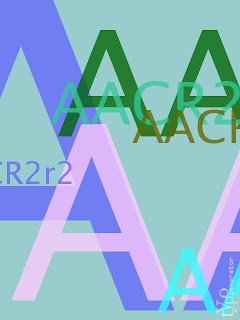I felt the need to post a few off-the-cuff responses to a couple of recent articles published in Educause, relating to Higher Education.
The first one is called
A Seismic shift in epistemology by Chris Dede.
The second is
Business cards for the future by Joshua Kim and Barbara Knauff, both Learning Technologists aspiring to become "Educational Change Agents".
Picking a few nits of my own; Dede first:
>>In this Classical perspective, experts with substantial credentials in academic fields and disciplines seek new knowledge through formal, evidence-based argumentation, using elaborate methodologies to generate findings and interpretations. Premier reference sources, such as the Encyclopedia Britannica, and curricular materials, such as textbooks, embody “authenticated” knowledge as compiled by experts and transmitted to learners. Epistemologically, a single-right-answer is believed to underlie each phenomenon, even though experts may not yet have developed a full understanding of the systemic causes that provide an accurate interpretation of some situations.<<
No, No, No, Wrong. What a simplistic caricature of “classical” knowledge. Can you say “
Strawman”?
“Single-right-answer” epistemology is what underlies standardized tests
& the like and has been the bane of educators for some time, rightly pointed out & sharply criticized by Neil Postman and Charles Weingartner, et. al. since the late 1960s.
More nits:
>>In contrast, the Web 2.0 definition of “knowledge” is collective agreement about a description that may combine facts with other dimensions of human experience, such as opinions, values, and spiritual beliefs<<
So Web 2.0 = fuck Occam’s razor?
Really??!
And as if moral/social values never colored research before the advent of the web.
What a parody.
Even the selection (or non selection) of certain facts to weave into a narrative betrays a value judgment. It’s inescapable.
And doesn’t require Web 2.0, either.
Dede quote:
>>Advocates for a Web 2.0 view of knowledge, expertise, and learning would challenge each of these three precepts of formal education. Many have documented politically motivated inaccuracies in textbooks, including biases against minorities and women, interpretations that privilege the perspective of the dominant subculture, and omissions of material about the contributions and interpretations of diverse groups, such as people of color. Experts may sometimes “speak truth to power,” but too often “experts” are anointed, funded, and rewarded to provide rationales for politically expedient actions. <<
Many who are not “Web 2.0 Advocates” (whatever that means) have been doing the same for years with old fashioned BOOKS and primary sources, too. Howard Zinn, James Lowen come readily to mind.
Web 2.0 doesn’t have a corner on the market for revisionist corrective.
As for the last point about Experts being anointed, funded….yeah, again, nothing new here. Well noted problem, didn’t require Web 2.0 to see it.
Geeze, Chomsky & Hermann’s
Manufacturing Consent has been in print…how long now??
Neil Postman was attacking the same deficiencies in the “Classical Model” since before ARPANET really kicked off.
I admit, I’ve got mixed feelings about Postman’s proposals in
Teaching as a subversive activity and, for all its shortcomings, I can’t say I haven’t gotten some mileage out of “traditional” learning, at least at the Post-secondary level (i.e. lecture courses, etc), as I’ve already discussed. I think Postman's revolutionary proposals were correctly aimed at Primary and Secondary Education. It's just that there isn't the political will to implement them.
Quote:
>> the response of most educators is to ignore or dismiss this epistemological clash. Many faculty force students to turn off electronic devices in classrooms; instead, students could be using search tools to bring in current information and events related to the class discussion<<
They could indeed, but in point of fact they’re often
SCREWING AROUND AND NOT PAYING ATTENTION/NOR DOING WHAT THEY’RE SUPPOSED TO DO.
Reasonable people can agree/disagree over how much this (student’s inattention) is the fault of the teacher/professor. It often is, especially in a secondary ed setting. I have more sympathy towards Secondary ed students rammed through our school system, especially with the greater number of standardized tests they get hit with these days. One Left critic of the No Child Left Behind Act that I know derides it mockingly as the “No Child Left Alone” act. I get where Postman is coming from in
Teaching as a subversive activity, or at least I think I do.
College students I have
much less sympathy for; In college, you submit to lectures from people who are much smarter and better read than you. You have to pay attention this time because the final isn’t going to be multiple guess like in High School, it will be essay-based. You have to express yourself, support your arguments factually, etc, and can’t expect to be able to BS your way through it. Those are the rules, you’re paying to be here, nobody put a gun to your head, and if you don’t like it, get the hell out. The rest of us don’t have time for your whiny, self-important b*llshit.
It’s too bad Postman passed away in 2003, I would’ve loved to have gotten his take on Web 2.0 advocates promoting his ideas/criticism as their own but adding the high tech “Twist” to everything.
Building a Bridge to the 18th Century was good, don’t get me wrong…I guess Neil would’ve ultimately said something like “everything you criticize about real, existing US secondary and post-secondary ed has merit, but it isn’t high technology alone that will get you out of this mess. Sometimes unplugging is the right move; slowing down, listening & talking is the right move.”
Why do I sometimes feel like I was the only one who actually enjoyed my traditional upper-level history lecture courses?
I really liked the way Dr. C.D. put together a lecture on Early Modern Europe, it was engaging and interesting to listen to. I also took his Russian history to 1890 class, and had had him for World Civ I (ancient civilizations like the Hittites, etc). Dr. C.D. is one awesome lecturer and I hope he's still going strong at TAMU. He made me refined history buff that I became.
Even the token TAMU hardcore Marxist Dr. R. got more and more interesting the closer we got to the 20th century (his lectures on Medieval and Renaissance culture were bloody awful to sit through, though). He started making more sense and becoming irresistible to listen to from about the French Revolution onward; We had to read excerpts of the Marx-Engels Reader from that class and after years of knee-jerk badmouthing Marxism that I learned from being a militant, clueless young Reaganite, when confronted with Marx face to face, I found I had no serious objections to what he was writing/saying by in large, and that was deeply unsettling back then.
It was my getting a "C" in my Senior History seminar that convinced me more than anything that I wasn't cut out for grad school in history, though. Though I soon found out I really wasn't cut out for literary studies after my first few seminars at Rice U, either (I wrote too much like a historian and had to re-train to write/think like a lit-crit person, which was painful. I've since gone back to writing in "Historical" mode, since that's the way I'm most comfortable with).
I admit, I can see in hindsight why my senior seminar professor thought my final paper sucked, but I really couldn't piece together how to make it better, either.
I like lecture courses because I like to sit and listen to what smart people who have read a hell of a lot more than me actually have to say, to give ME more things to think about than I would otherwise come up with on my own.
That's not passive--it's still interactive!
Higher Ed works, or at least worked well enough for me, and I don't want to see it f*cked with.
On to Knauff and Kim, quote:
>>We understand that in pushing for a new model of postsecondary educational
delivery, we are taking a stand against the old model of faculty-centric, lecture based courses. We are challenging a system that has worked very well for many
stakeholders and institutions for many years.<<
Including yours truly.
>>We firmly believe, however, that change is inevitable, primarily because
new cohorts of students steeped in the norms of knowledge creation, information
abundance, and constant communication and collaboration will no longer
accept the traditional lecture model,<<
There's an old fashioned word for people who come to college and refuse to accept the traditional lecture model...what is it now...um...oh yes, we called them
College dropouts.
Anyway, do continue...
>>in which they are passive receptacles of scarce knowledge.<<
It isn't PASSIVE, as I clarified above.
>>Learning/instructional technologists will have an essential role to
play in the transition to a more participatory model of higher education.<<
Go work your magic at the Primary and Secondary levels and leave Higher Ed alone, please.
Secondary and Primary Ed in the United States are deeply flawed, especially the culture of standardized testing, but I don't know that a techno-fix is necessarily the answer.
The main problem with Higher Ed is so many students coming to college woefully unprepared and underprepared for college level work, plus the cultural ethic that everyone who is successful must go to college; the biggest pervasive mythology is that you can study whatever you like in college and still come out and do whatever you want so long as you set your mind to it. True enough for trust fund babies attending Ivy League schools perhaps, but not for your average middle and working class student attending the nearest State U.
If I had grown up under the German system of Higher Education, where my education was state funded rather than on the backs of my parents, who knows what I might have become. As a 5th year senior, I took my last advanced math class, a pre-cal class. For the first time in my life, I scored a 100%, on my final exam no less. For the first time in my life, I actually felt like I had a grasp of mathematics, and was no longer terrified of the subject. But that was the end of my math requirement, and it was not financially feasible for me to press forward in mathematics, even though I was developing a desire to do so. I later took a research methods class in Library school that was very statistics oriented and it darn near killed me, having to resurrect those long forgotten math skills, but I did finally "bootstrap" my way to an A- (after first having to take an incomplete to have more time to work on the class). Many of the problems of Higher Ed are structural like this, not because of a lack of technology in Higher Ed.
Open inquiry models, where the teacher is facilitator and guide and lets the students pursue their own interests and mostly asks Socratic questions...that sort of experimentation belongs at the Secondary level and below. Neil Postman offers a challenge to all teachers who think they know something to please write a book about it. Well, many college level instructors have done just that. They've earned the right to be a talking head, the sage on the stage, and some of us want to hear what they have to say.
No actual lecture course I've ever enjoyed sitting through was ever as passive as these newer theorists would have you believe. It may not work at the secondary and primary levels, fair enough. But it does work in Higher Ed, along with reading books and articles (yes, sometimes online) and writing and basing arguments on evidence and research, subjected to relentless peer review and criticism. A pursuit of Truth does not mean "looking for the one Right Answer" as Dede mistakenly conflates it, and which would make Neil Postman do a proverbial "facepalm".









